- Home
- Rebecca Levene
Kill or Cure Page 9
Kill or Cure Read online
Page 9
"It wouldn't have done you any good." She came closer, but her hand was empty. She wasn't pointing a gun at me, just yet. "The tracker system's more sophisticated than you realise. There's a roam-zone programmed for every individual. An alarm goes off when anyone breaches it."
"And I just breached mine," I guessed, but she shook her head.
"Twenty meters out in that boat and you would have. We thought we'd stop you before that happened." She glanced at Soren and he stared straight back at her. For the first time I registered the way he leant subtly towards her whenever she was near, like a plant responding to the sun. He doesn't care about me, I thought. He came because she asked him to. Another piece of information I could file away for later use - if there was a later.
Their hands were still nowhere near their guns. They weren't looking like they thought I was any kind of threat. Tackle Kelis, a voice inside me said, surprise her, take her gun. Shoot Soren. Possible, maybe. But I wasn't going to do it.
"So... how exactly did you find me?"
Kelis shrugged. "I knew what you were planning - you'd been twitchy all day. Acting too casual. I was a corrections officer, back before. You learn to read the signs." That startled me. Not so much the information, because it wasn't that hard to imagine, but the fact that I'd spent so many hours with her and I'd never asked about her previous life, hadn't even really wondered.
The Cull was like a big black wall cutting across the past. You couldn't climb it, so why would you want to know what was behind it?
"So you came down here and waited, right?" It was dispiriting to realise I'd been that transparent. "Why?"
She shifted and, for the first time since I'd met her, looked unsure of herself. It was Soren who answered. "Queen M would kill you if she knew what you were planning."
"And you didn't want that?"
He shrugged and looked at Kelis. "She didn't."
"You're here to stay," Kelis said. "Accept it."
"And what if I can't?"
She looked away, out into the dark void of the open hatch and didn't bother to answer me.
Next day I was back in the lab, researching a problem whose answer I already knew. Still, the source of the infection might be obvious, but how it had metamorphosed remained a mystery. A couple of years as a research assistant had taught me to perfect the art of looking busy while remaining essentially idle and I didn't think the other scientists in the room had any idea that the tissue cultures I was taking, and the slides I was carefully preparing were entirely meaningless. The only thing I managed to establish for sure was that the virus was transmitted though blood and not an air-borne contagion. That at least was something I could tell Queen M.
Kelis and Soren were back, shadowing me from the moment I woke up. Their decision, I guessed. I wanted to believe that Kelis hadn't told Queen M what happened the night before. My eyes twitched briefly, involuntarily, to the autopsy table in the centre of the room. To the convenient little grooves to carry away the blood.
I felt the tension in the lab before I saw her. I felt it most of all from Kelis, and when I looked up to see Queen M standing in the doorway of the room, I didn't know if it was because she'd betrayed me or because she hadn't.
Queen M smiled and I still didn't know, her expression as un-giving as an investment banker. "Come and walk with me," she said, nodding at Kelis and Soren in a way that let them know that they weren't included in the invitation.
A little trickle of ice-water seeped down my spine.
"We haven't really spoken properly since you arrived," she said when we were out of the lab, heading up the stairs which would take us to the sun deck and the empty pool.
"I'm sure you've been very busy." I injected a note of irony into the words. She knew I didn't like her and she'd get suspicious if I started pretending that I did.
"I used to be an academic, did you know that? Reader in evolutionary psychology at the LSE."
My head snapped round to look at her: cornrows, beaded braids, wide, thoughtful eyes. It wasn't that difficult to believe. "You've come up in the world."
"Down is what you mean," she said, then held up her hand, stopping my protest almost as soon as it had formed on my lips. "No, it's OK. I know exactly what you think of me. You hold me responsible for those deaths you witnessed, you're imagining many more and you're completely right. I am responsible, and there were more. You think I'm a monster."
I looked away from her again because I didn't want her to see exactly how true that was.
"But you're in a unique position," she said softly. "You're the only person in the world who didn't see what happened after the Cull. You can still go on thinking all those cuddly things about human nature that four thousand years of civilisation allowed us to believe. Have you heard of Hobbes' Leviathan?"
I shook my head.
"But you've heard about life being nasty, brutish and short, right? That was Hobbes, telling it like it is - when there isn't a state around, an all-powerful Leviathan, to force people to listen only to their better angels."
"So - what? You knew how bad people could be and you decided to be worse? Becoming a monster was inevitable so you decided to embrace it rather than fight it?"
She smiled at me, the small patronising grin of a professor who's about to score points from a first-year undergraduate. "Hobbes saw, and the Cull showed, what human beings become in the absence of a state monopoly on violence. You think I'm bad, that this society is bad, but that's only because you haven't seen the rest of the world. I have to be a dictator, or someone has to, because the only other option is chaos."
"Those people in Paris seemed to be doing OK, till we came along." My words were marinated in two weeks of bitterness.
"No, they really weren't. Three quarters of them were already dead. Half the women had been raped - and not always by rival gangs. That baby, the one you left behind? Her mother didn't know who the father was - it could have been any one of the men who caught her out after dark one night and spent the next seventeen hours doing exactly what they wanted with her. You think this is bad, Jasmine, you think I'm a monster, but that's only because you haven't seen the alternatives."
It was the first real passion I'd heard in her voice. Her eyes were finally alight with something other than a cold amusement. "They don't just stay because of the tags in their legs," she said finally. "However much you might want to believe that."
"And why are you telling me this?" I asked eventually. We'd reached the top of the ship. The sun, the distant sand, even the sky was white and fierce. Unyielding.
She was looking out over the ocean rather than at me. When she turned back, her face was closed again. And though I knew the earlier openness had been real, I also knew it had been calculated. "You are only staying because of that tracker in your leg, and that isn't healthy. I want you to believe in what we're doing here. I'm not looking for slaves, I'm looking for followers - committed ones. And I never want you to try again what you did last night. Because the next time you do, I'll kill you. And it won't be anything like as quick and pretty as the deaths you saw in Ireland."
I smiled bitterly and didn't say anything. What was I going to say? I believed her threat absolutely. I nodded to her, not sure what I meant by it or what she'd think I meant. Then I walked quietly back inside, away from the punishing sun.
Haru was still where I'd seen him that morning, hunched over a vivid line drawing of a young girl being ripped apart by zombies. The deck 10 children's pool beside him was filled with a thin slurry of pond scum.
"OK," I said. "Why should I trust you?"
He looked surprised only for a moment. Then he smiled. "Because I want to get out too, and I think you can help me. You know we've got a much better chance together."
"Your life here isn't so bad. Why would you want to change it?"
He opened the leather portfolio that was always with him, and for a moment I thought he was going to show me another drawing. But the thing he pulled out was a photo, a lit
tle dog-eared around the edges: a young boy, maybe ten, sitting hunched in a wheelchair, frail legs twisted like pipe cleaners in front of him.
"My son," Haru said. "Back in Japan. Not at all the sort of person Queen M wanted in this 'Brave New World'"
"Then," I said, "let's talk about what we need to do."
The day after Queen M gave me her strange little pep talk, Haru introduced me to Ingo: blue-black skin, soft, deep African accent. A boyish face that was probably older than it looked.
"I run the network," he told me, taking my hand in a firm, enveloping shake. He had long artist's fingers, but I could see that most of the bones in them had been broken some time in the past, and reset crooked. I didn't need to ask why he wanted to escape.
"The computer network?"
He nodded.
"And I'm guessing your job involves more than telling people to switch it off and then switch it back on again?"
He didn't smile. His face was so unlined that I wondered if he ever did. "I take care of it all," he said. "Including the tracker system."
"You can disable it?"
"Of course." And he did smile then, but it was little more than an upward twitch of his lip.
"Permanently?"
He shook his head. "She had me set up the central core so it was password protected, and she has hard copies of all the information."
"But it was you who set up the password, so..."
"She is not stupid. There were four of us who worked on this. I was the project leader, but each of us oversaw the other's work. And she told us - if one of us saw something and did not report it, we would be punished just as if we had done it ourselves. There is no backdoor. The system is unbreakable."
"OK then." I looked down, disappointed. "But you can take it down, at least for a little while."
"Yes," he said. "That I can do."
After I spoke to Ingo I waited until, a week later, I got what I needed: a fresh corpse from the plantations and an excuse to perform an autopsy on it. Twenty years old, fit as a fiddle, and dead for no reason. I caught myself almost smiling at the family when they told me what had happened; how he'd been talking about the weather one minute, dead the next. Their numb, tear-streaked faces looked back at me, hoping I'd have some explanation for their sudden wrenching loss, and the smile faded into nothing.
I radioed the ship, asking for the lab to be cleared so I could perform an autopsy on a potentially infectious vector. "I'm sure it's nothing, just a weak heart," I told Queen M. "If you prefer I can cut it open out here, take a quick look. Then the family can have him back and buried by the end of the day."
"No," she said. "better to be safe. The equipment you've got out there isn't sophisticated enough to pick up anything important. Bring the boy in - and keep yourself in quarantine until you can give me the all clear. I don't want anyone but you coming into contact with that body."
"Fine," I told her, "but you'll need to keep the family in isolation too." The smile was back again and this time there was nothing I could do to suppress it. I ended the call before Queen M could hear it in my voice.
I didn't look at the man's face as I cut him open. I was sure I'd read an accusation there, that I was desecrating the only thing left of him in this world for no real reason. Chest first and yes, I could see it, the hole in his heart that had killed him. But there was no one in the lab to share the find with me, the spectre of an infectious agent that much more terrifying in a post-Cull world. I carried on cutting, as if I was still searching for something more elusive.
Getting the chip out should have been easy - cut into the thigh, through to the bone, and that's it. Except that Queen M would only have to take one look at the body and she'd know exactly what I'd done. And I was damn sure that she'd look at the body.
But the organs - those I had a good reason to poke around in. I took out the liver and the pancreas, the coiled crimson length of the gut, releasing the stench of half-fermented shit into the antiseptic atmosphere of the lab. The human body really is like an overstuffed suitcase. You look at everything that comes out of it and can't believe biology ever fitted it all in there.
I took tissue slides of each organ and looked at each of them under the microscope - his liver was like a sixty-year olds; he must have moved straight from breast milk to rum. Nothing of note in the kidneys or the testes, but then I hadn't expected there to be. Finally, I went back to the whole point of the exercise: burrowing down through the now conveniently empty chest cavity to drill a small plug out of the pelvic girdle. I took the bone, slick with blood and worse, and slid it into the pocket of my slacks, into the little zip lock bag I'd hidden there earlier.
Then I burrowed deeper still, through the flesh along the edge of the bone. I had unwelcome flashbacks to cooking for him, carving the raw meat as he looked away, pretending he was too squeamish to watch. Letting us keep up the fiction that his job wasn't the inverse of mine, making death out of life. You're better off without him, a voice said inside me, and I wasn't sure if it was the Voice, waking up from the drugged haze I'd put it in those last few weeks or just the voice of reason I was never able to hear when he was near. Love isn't blind, that's the trouble. You see all the faults and all the insurmountable problems - you just don't care.
I still didn't. That, in the end, was why I needed to get out of there. I could tell myself all kinds of comfortable lies about freeing myself from despotism, but in the end it was all about him. While I was there, I would never see him again. Out in the world, maybe - and that was just about enough.
And there, at last, it was. The chip, inserted tight into the bone but not tight enough that I couldn't pry it out. It went into my other pocket and then all I had to do was stuff all those organs back into the body and sew it up, stitches as neat as I could make them because this was the body his family would be burying, the last sight they'd have of someone they'd once loved. Not much recompense but the best that I could offer.
Then I went to see Ingo.
"Magnetism," he told me. The chip looked tiny in the pink cradle of his palm. "If it is strong enough, you will degauss it."
"Great," I said. "Because a giant magnet is just the kind of thing we're going to find lying around on a ship."
"No," Ingo said, entirely seriously. "I think you are mistaken. It is highly unlikely that there will be a magnet of sufficient size anywhere in the fleet."
Behind his back Haru rolled his eyes and I had to suppress a smile, but it wasn't really very funny. If we couldn't solve this problem then the plan was dead. The chips had to be deactivated.
We'd met in a little room to the side of the main lab, home to the centrifuge and a collection of embryo-filled specimen jars which gave Haru an excuse to be there. He was sketching as we spoke, some kind of squid monster emerging from the machine in the centre of the room. One of its tentacles was about to grab, or possibly indecently assault, the most humourless of my lab mates. Ingo was inspecting my laptop, which I'd reported as broken. I reckoned we had another five minutes of talk before our little gathering started to look suspicious. Then we'd be back to using Haru as our go-between.
My eyes drifted back down to my own work, a fruitless tissue culture I was growing from the now half-decayed Infected. I was no closer to finding out how the hell the Cure had turned from a vaccine to a virus, and my lack of results was starting to seriously piss Queen M off. Yet another reason we had to figure out a way past the chips.
"What about electricity?" I said. "Could we fry the things?"
"Yes," Haru said, his hand busy sketching lightning bolts around the squid monster. "And fry us in the process."
"It's possible for the human body to survive a lightning strike. A current that would kill the chip might leave us alive. Right?" I said to Ingo.
He tilted his head, considering this with his usual infuriating slowness. Then he nodded. "Yes, that is possible."
"'Might'?" Haru said. "'Possible'? These aren't the words you want to hear when you're talking ab
out putting twelve thousand volts down your spinal column. How about words like 'definitely' and 'entirely safe'?"
"What about that kind of electricity?" I asked Ingo. "Can we find that anywhere on the ship."
"The engine room. Maybe." He shrugged. "I cannot say for sure. My work uses currents considerably lower."
"You'll need to search then," I told Haru. "See what you can find."
"Sure, why not? Maybe it will give us superpowers, turn us into Team Electro - if, you know, it doesn't kill us all first."
Then Barbados, and Haru was showing me his sketchbook again. The pictures were getting wilder, more fantastical, as if the approaching escape was firing his imagination, or maybe just letting the darker recesses of his subconscious peek through. I wondered what Queen M would make of it all.
I wondered if he showed them to her at all, now that there was something else there - hidden in the logo of a t-shirt, the pattern of the carpet. For the last two weeks he'd been painstakingly compiling plans of the ship: each deck a different drawing. And here, in the seemingly random leaves of a tree, the outlines of the islands, each military base picked out in darker green. The waves on the ocean in another drawing were a complex circuit diagram, a wiring plan for the ship. And in each night-time picture the stars were the charts we'd need to navigate our way to freedom.
"This is everything?" I asked him.
"I've been everywhere on the ship. Even into Queen M's quarters. It's all here."
"And nobody suspected anything?"
"Do I look suspicious?" He grinned boyishly, flashing the gap between his front teeth and, no, he didn't. He looked like the likeable nerd who didn't get the girl at the end of a John Hughes movie. Which, given how much of this plan depended on him, didn't exactly fill me with confidence.
"So we're ready to go," he said.
"Yes," I said. "I guess we are."

 Smiler's Fair: Book I of The Hollow Gods
Smiler's Fair: Book I of The Hollow Gods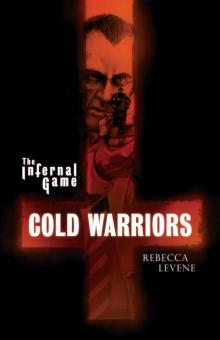 Cold Warriors
Cold Warriors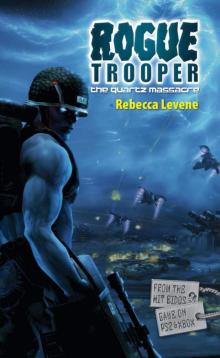 The Quartz Massacre
The Quartz Massacre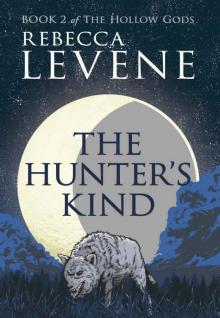 The Hunter's Kind: Book II of The Hollow Gods
The Hunter's Kind: Book II of The Hollow Gods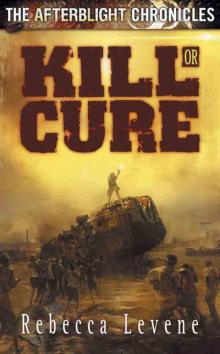 Kill or Cure
Kill or Cure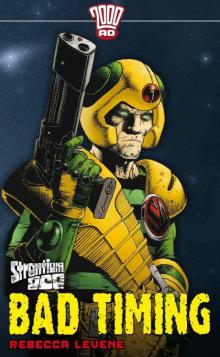 Bad Timing
Bad Timing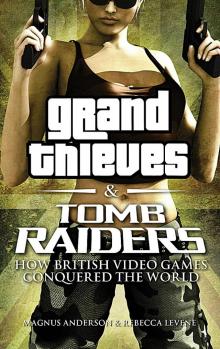 Grand Thieves & Tomb Raiders
Grand Thieves & Tomb Raiders Ghost Dance
Ghost Dance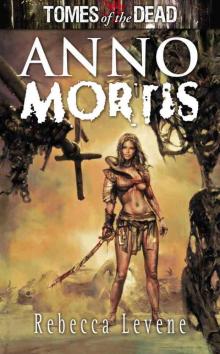 Anno Mortis
Anno Mortis